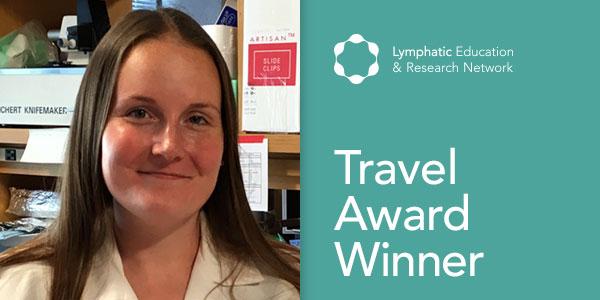Echoe Bouta, Ph.D. at Massachusetts General Hospital and Harvard Medical school under the supervision of Timothy Padera, Ph.D., received a Travel Award from LE&RN to attend the 2017 Lymphatics Forum in Chicago. We asked Echoe to share her thoughts on that experience with us and to tell us a bit about her research and future plans.
What did you get out of the Forum? Why did you feel it was important to attend?
As a researcher early in my career, the opportunity to meet and get feedback from other researchers studying lymphatics is invaluable. In addition, learning about the progress being made in the field is a beneficial and motivating experience.
What are your areas of interest in research?
Lipedema is a chronic disorder that results in increased fat in the lower limbs and manifests as dramatic, painful swelling. The etiology of lipedema is largely unknown and treatments are often ineffective, demonstrating a need to understand the relationship between fat and lymphatic capability to catalyze more effective therapies. My project focuses on understanding this relationship in mice. I hope to gain a deeper understanding of how fat formation near lymphatic vessels impairs lymphatic function in an animal model of obesity.
What are your hopes and plans for your career and your research?
I hope to use the molecular pathways I identify that contribute to lymphatic dysfunction to identify therapeutic targets that restore lymphatic function in the presence of increased adiposity. These therapeutic targets will hopefully be translatable to clinic. The goal of making clinically relevant discoveries is something I hope to continue to pursue after my post-doc.
Why do you believe that, in general, lymphatic research is important? What might the field accomplish within the next few years?
The lymphatic field is growing, making this an exciting time for fundamental discovery. Therefore, we are currently building the tools essential to do the rigorous science needed to understand the true implications of lymphatic function in disease. In the last decade, it has become evident that many diseases have a lymphatic component. My hope is that in the next few years, the lymphatic field will continue moving further into clinic, including clinical trials focused on targeting lymphatic dysfunctions.
Programs such as LE&RN's Travel Awards program advance the scientific community's understanding of lymphedema and lymphatic diseases, allows for increased communication between researchers, and raises the profile of lymphatic research. These programs are only possible as a result of the generosity and dedication of LE&RN's corporate sponsors and Supporting Members. If you are committed to LE&RN's mission of fighting lymphedema and lymphatic disease through education, research, and advocacy, become a LE&RN Supporting Member today.

